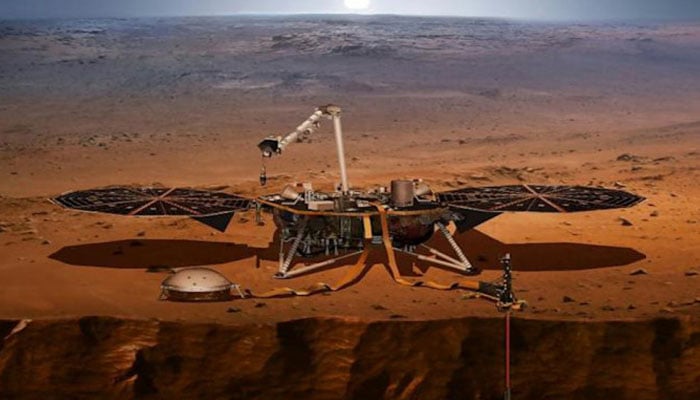Why are days on Mars getting shorter? Here's what Nasa InSight says
Nasa InSight data reveals that spin of the Mars was increasing by 0.76 milliseconds per (Earth) year
August 18, 2023

The latest data from Nasa's InSight Lander showed that Mars is rotating faster every year, resulting in a decreased time span of its days which has never happened before.
Mars is an oxymoron in and of itself because it has almost no atmosphere. The planet has a liquid metal core that is unstable causing it to spin ceaselessly and it is also a freezing desert.
Until a research team discovered indications of acceleration using InSight's RISE (Rotation and Interior Structure Experiment) instrument, the growing spin remained unclear.
Further analysis of the RISE data from InSight's first 900 days on Mars revealed that the spin of the planet was increasing by 0.76 milliseconds per (Earth) year.
Why are Martian days getting shorter?
RISE's primary goal was to measure the amount of wobbling that Mars experienced when the Sun's gravity pushed and tugged on its orbit. The core's likelihood of being solid or liquid would be determined by this. RISE was then tasked with measuring the duration of a Martian day.
“Sols” or Martian days are 24 hours and 37 minutes long, roughly half an hour longer than Earth days. With the help of reflected radio signals, RISE calculated Mars' rotational velocity and wobble. The Deep Space Network (DSN) radio signal would be picked up by it so that it would reflect the waves back to Earth.
The InSight team was able to determine how the lander was travelling toward Mars by comparing the frequency of the signal provided by the DSN and the signal that came back to Earth.
RISE observed changes in day length more precisely than previously, with five times more accuracy than the Viking landers had. Orbital wobbles and the length of a day on Mars were revealed by changes in the frequency of reflected radio waves.
RISE also discovered proof that Martian days were getting a little bit shorter in another way. It also monitored changes in carbon dioxide levels near the poles, where CO2 will sublimate during the planet's spring and summer warming, and condense during the planet's autumn and winter cooling.
While scientists are certain of the precise cause of Earth's rotational slowdown over billions of years and lengthening of our days, they are still unsure of why Mars' spin is speeding and reducing its days. However, there's a good likelihood that it may have anything to do with alterations in the ice caps of the red planet.
Areas that had been covered by ice become mostly ice-free as carbon dioxide ice on the Martian ice caps melts due to sublimation during the warmer months. According to Le Maistre and his team, post-glacial rebound or ice accumulation (or both) would cause Mars' bulk to rotate closer to its axis.











